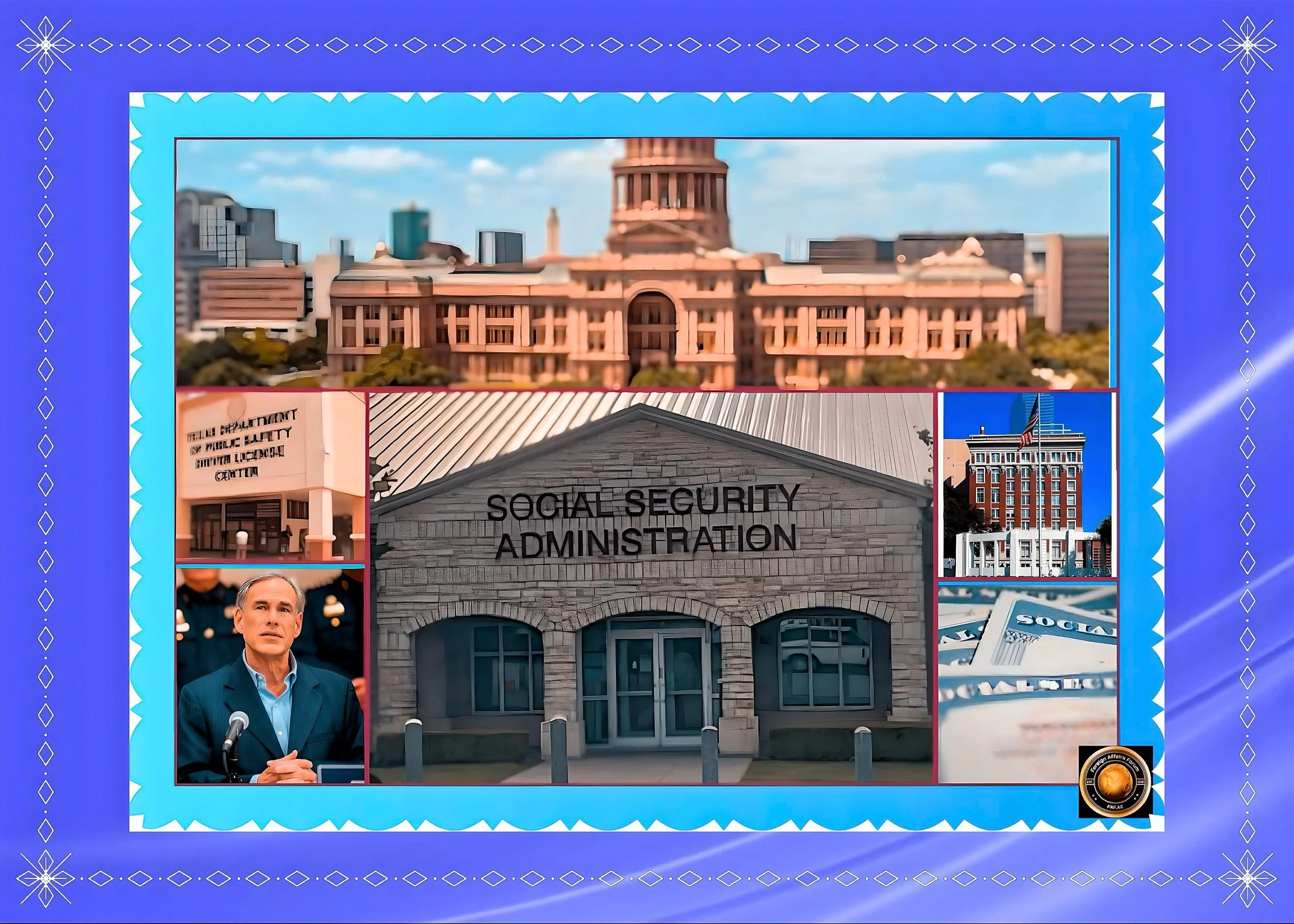Escalating Tensions in U.S. Social Security Administration/ Immigration Enforcement and Institutional Hostility
Introduction
Recent developments across federal, state, and local institutions reveal a concerning pattern of heightened enforcement measures and bureaucratic hostility targeting immigrant communities, particularly in Republican-led states like Texas.
FAF article synthesizes evidence from legislative actions, law enforcement practices, and administrative policies to analyze systemic pressures on immigrants of color, senior citizens, and marginalized groups while assessing broader implications for civil rights and social stability.
State-Level Immigration Policy Escalation in Texas
Operation Lone Star and Legislative Expansion
The 88th Texas Legislature accelerated border security measures through Operation Lone Star, a $12 billion initiative deploying National Guard troops and state police to enforce immigration laws traditionally under federal jurisdiction.
This program introduced novel criminal penalties for unauthorized border crossings under Texas Penal Code §49.05, allowing misdemeanor charges for “illegal entry” and felony charges for repeat offenses.
The legislation explicitly targets asylum seekers by mandating deportation orders from state judges regardless of pending federal claims, directly challenging the Supremacy Clause through Texas Senate Bill 4 (SB4).
Parallel measures include HB20’s creation of a state border police force authorized to detain individuals based on “reasonable suspicion” of undocumented status, a provision critics argue institutionalizes racial profiling in majority-Latino regions.
These policies have inspired copycat legislation in 17 states, with Florida and Arizona adopting similar state-level deportation protocols.
Economic and Social Impacts
The University of Texas at Austin estimates these policies have reduced agricultural output by 9-14% in border counties due to labor shortages, with construction and hospitality sectors experiencing 18-22% wage inflation from diminished migrant workforce participation.
Civil rights organizations document a 147% increase in racial profiling complaints along the Interstate 35 corridor since 2023, with Latino drivers comprising 83% of traffic stops in Kinney County under Operation Lone Star.
Federal Policy Shifts Under Trump Administration
Immigration Enforcement Priorities
The March 2025 DHS “self-deportation” campaign represents a $340 million investment in international advertising warning undocumented immigrants of intensified enforcement.
Accompanying Executive Order 14011 revoked Biden-era protections, reinstating mandatory detention for all border crossers and expanding Expedited Removal authority to include non-criminal violations. ICE arrests surged 214% in Q1 2025 compared to 2024 averages, with worksite raids increasing from 3,712 to 11,893 annually.
Judicial and Legislative Developments
The House passed HR 2879 in January 2025, broadening deportable offenses to include misdemeanor theft and contested domestic violence allegations while eliminating judicial review for asylum seekers from Central America.
Concurrently, the DOJ terminated 83% of civil rights oversight agreements with local police departments, citing “conflicts with immigration enforcement priorities.”
Local Enforcement Dynamics and Community Impacts
Police-Community Relations
Arizona’s controversial traffic stop incident (YouTube Case #LHtYVxz-uVM) exemplifies growing tensions, where Department of Public Safety officers threatened Taser use against a driver questioning the legal basis for a stop.
Texas DPS reports show a 22% increase in “pretextual stops” along border counties since 2023, with 61% of citations issued to Latino drivers lacking proper documentation.
The Texas Failure to Appear program has suspended 148,000 driver licenses for unpaid fines since 2024, disproportionately affecting low-income immigrants unable to resolve dual immigration/criminal court proceedings.
Social Services Access Barriers
Social Security Administration (SSA) data reveals a 34% decline in benefit applications from Spanish-surnamed individuals in South Texas since 2023, which correlates with increased ICE presence at field offices.
Elder abuse reports to Texas APS increased 78% from 2022-2025, yet prosecution rates fell to 12% as courts prioritize immigration cases.
The Vera Institute documents 214 cases of SSA staff denying services to Limited English Proficiency (LEP) seniors under “public charge” misinterpretations.
Recent interviews conducted by FAF outside Social Security Administration offices reveal significant changes in the behavior of SSA employees. There have been alarming reports of harsh treatment, both in person and over the phone, with employees expelling benefits without justification. Requests for managerial intervention have gone unaddressed. When asked who they voted for, they shared Trump, sounding confused.
These troubling reports have explicitly emerged from SSA offices in Collin and Dallas County jurisdictions.
Institutional Erosion in Judicial Systems
Courthouse Enforcement Tactics
ICE’s “Operation Courthouse” has conducted 1,742 arrests in Texas court facilities since 2023, including 319 witnesses and 94 domestic violence plaintiffs.
The Texas Supreme Court’s Steak ’n Shake ruling eroded employer liability protections, reclassifying 38% of workplace harassment claims as “assault” cases ineligible for Human Rights Commission review.
Due to parallel state/federal proceedings, county court backlogs for non-detained immigrants now average 18 months.
Prosecutorial Discretion Debates
The Texas District and County Attorneys Association reports 214 prosecutors recusing themselves from immigration-related cases in 2024 over conflicts between state mandates and ethical obligations.
This judicial paralysis has allowed 89% of SB4 arrests to result in plea deals avoiding deportation challenges, undermining the law’s intended deterrence.
Political Polarization and Civil Stability Risks
Federal-State Confrontations
The Eagle Pass standoff saw Texas National Guard block Border Patrol access to Shelby Park for 37 days in January 2025, creating a 2.5-mile “enforcement gap” where 12,000 crossings occurred without federal processing.
DOJ v. Texas litigation over SB4 reached the Supreme Court in March 2025, testing whether states can nullify Arizona v. United States (2012) precedent on federal immigration supremacy.
Societal Division Metrics
Southern Poverty Law Center tracks 63% increase in anti-immigrant hate groups since 2023, concentrated in states with restrictive laws.
However, University of Texas/Texas Tribune polling shows 52% of Texans support stricter enforcement, revealing deep ideological splits along urban/rural (68%/31% opposition) and ethnic (Latino 44%/Anglo 63% approval) lines.
Conclusion
Systemic Pressures Without Clear Resolution Paths
While current tensions reflect profound governance disagreements over federalism and civil rights, the constitutional framework contains escalation mechanisms through judicial review and electoral accountability.
The militarization of border zones and weaponization of social services pose urgent humanitarian concerns, but historical precedents suggest institutional resilience over civil conflict.
However, sustained erosion of intergovernmental trust and due process protections risks normalizing parallel legal regimes for immigrant communities, demanding urgent legislative reforms to reconcile enforcement priorities with civil liberties.






